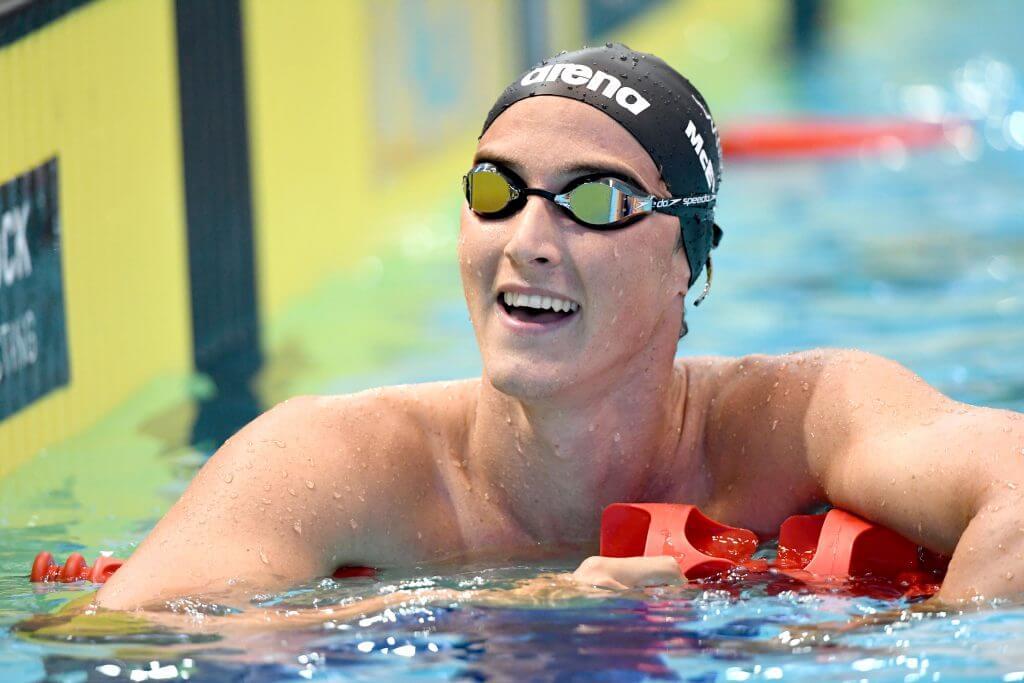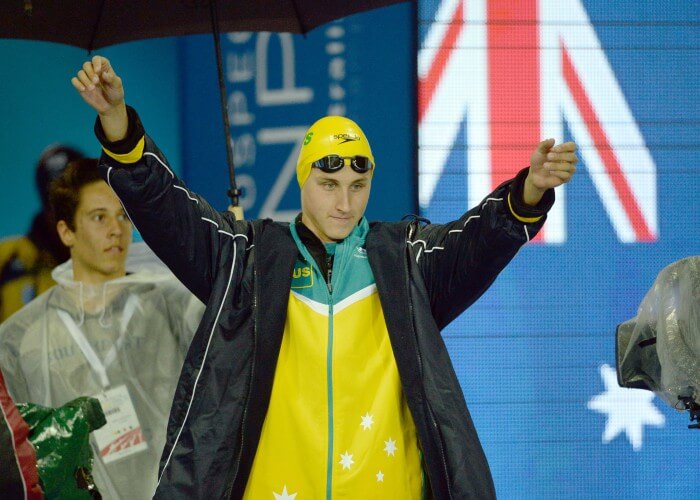Aussie Cam McEvoy, Rekindling For 2021, Found Inspiration in Michael Phelps

Cam McEvoy – Swimming’s Space Man
“In space.” The answer given by Cameron McEvoy when asked where he sees himself in 10 years. The physics and mathematics student from Queensland is one of the fastest freestyle sprinters of his generation, but what makes this aspiring astronaut different?
McEvoy was born and raised on the Gold Coast, witnessing the dominance of Australian legends such as Ian Thorpe and Grant Hackett. Twenty-four years later, McEvoy returned to the sunny Queensland city, winning a total of six medals at the 2018 Commonwealth Games. However, like many young swimmers, McEvoy´s career in the water began while idolizing the great Michael Phelps.
“Phelps was the biggest role model for me,” McEvoy said. “He exemplified what it meant to train hard and to race perfectly. I specifically remember watching the 2007 World Champs on TV when he broke Thorpe’s 200 freestyle record. I was 13 years old and remember the day after that final, my training shifted into another gear”.
As a junior, McEvoy burst onto the international scene in Peru, where he took both the 50 and 100 freestyle titles at the World Junior Championships. This golden double was the start of an upward trajectory that saw McEvoy become the favorite to take the title at the Rio Olympic Games, just five years later.
Heading into the Games in 2016, Cam McEvoy was hyped with expectation. His times of 21.44 and 47.04 in the 50 and 100 freestyle at the Australian Championships sent shockwaves through the swimming world. Considering his obvious form in the water, McEvoy has publicly admitted that the Games did not unfold as he, nor many others, expected. Finishing seventh in the 100 and failing to make the final in the splash and dash just two months after his success at Trials, was a bitter disappointment for the young 22-year-old. Yet despite this bump, his mental approach was unwavering.
The Australian noted that he is naturally inclined to break things down into meticulous detail both in and out of the pool. It is this inclination that has undoubtedly facilitated his studies within the fields of both physics and mathematics, as well as his ability to digest major disappointments within his sporting career. McEvoy admits that outside of the pool, physics has not only become his passion, but a field that has gripped him over the years, warranting his “professor” nickname at poolside. Indeed, while becoming the first Australian to complete a historic treble, winning the 50, 100 and 200 freestyles at the 2016 Australian Championships, McEvoy attracted attention by wearing a swim cap celebrating the first observation of gravitational waves that had been announced just two months earlier.
“I don’t think I would be as good as I am without the constant attention to all the details from an extremely young age,” McEvoy said.

Photo Courtesy: Delly Carr
As part of his Tokyo preparations, in August 2018, McEvoy made the decision to move from his longstanding home at Bond Swimming Club to join Chris Nesbit and TSS Aquatics. This decision was heavily questioned. Given the distance-focused nature of the program and McEvoy’s sprint background, TSS was not an obvious suit for the Olympic medalist. When asked about the move to TSS, the young sprinter admits that while preparations for next year’s Games have been going extremely well, there remains a lot to do.
While the circumstances surrounding the Olympic Games’ postponement are both heartbreaking and shocking, another 12 months in the water is a blessing in disguise for the Aussie. McEvoy shared a quote from storied Australian swim coach Michael Bohl, stating, “The Olympics are simply about creating a predictable result in a very unpredictable environment.” This simple and methodical approach is seemingly synonymous with McEvoy both as a swimmer and young man.
McEvoy is under no illusion as to what is required for him to succeed. McEvoy explains that for many years, he spent time attempting to embody an approach to the sport of swimming that was not naturally in line with his character, causing the sprinter to question his natural strengths and weaknesses.
“The problem with having a unique approach to things is that not many people can intuitively understand,” McEvoy said. “Becoming more aware of this and then also being able to articulate it so it is understood, has been a challenge for me”
Should he be successful in qualifying next year at the Australian Trials, Cam McEvoy will become a three-time Olympian in Japan, an accolade that only a small number of Australian swimmers have ever held. Despite the disappointment of Rio presumably still fresh in his mind, McEvoy said that his entire perspective toward the sport of swimming has changed considerably over the last four years.
“2020 Cam is very different to 2012 Cam,” he said. “In 2012, I was very new to the international swimming scene. I was going with the flow and was quite unconscious of things. Now in 2020, I have gained a massive amount of experience”.
Although the Australian sprinter is undeniably one of the favorites to qualify next summer and indeed perform well at the Games, his nationality can be viewed as somewhat of a disadvantage. McEvoy has been a constant in an ever changing Australian 4x100m freestyle team over the last eight years, winning a bronze medal in Rio with teammates James Roberts, James Magnussen and, of course, Kyle Chalmers. However, so strong is the depth in Australian sprinting, McEvoy must springboard back from a disappointing 2019 season and return to his pre-Rio form to guarantee a place on the team roster next summer. In contrast to many athletes who will be detrimentally affected by the Olympic postponement, the additional 12 months of TSS guided training now available to McEvoy should increase his chances of Olympic success.
Given the strength Australia now holds and with 2016 Olympic champion Chalmers already on blistering form in 2020, Olympic medals seem likely for the four individuals who manage to be selected for the Games. Nevertheless, Cam McEvoy remains realistic.
“Recent history tells us all that everyone should expect the unexpected in an Olympic men’s 4x100m freestyle relay,” he said. “Just look at 2000, 2004, 2008 and 2012 alone.”
When the Australian Championships are held in 2021, all eyes will certainly be on the young Australian sprinter, eager to see if he can match his 2016 form and gain a chance to step up once again against the best swimmers in the world.



